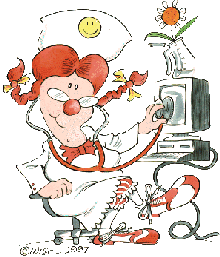
Patty Wooten presents ... 
Physiological Effects of Laughter
From Journal of Nursing Jocularity, Fall 1991, 1(3), pp 46-47.The medical community has recognized the harmful effects of stress upon the health of individuals for many years. Disease states such as hypertension, peptic ulcers, insomnia, ulcerative colitis, and coronary heart disease are, at least in part, a result of prolonged stress and poor coping techniques. Stress or negative emotion has been associated with immunosuppression, partially modulated by increased epinephrine and cortisol blood levels. It has been suggested that the pleasant feelings occurring with mirthful laughter can modify some of these neuroendocrine components of the stress response. Psychoneuroimmunology, a new area of research exploring the links between emotions and the immune system, has clarified some of the changes occurring in response to both positive and negative emotions. Dr.'s Lee Berk and Stanley Tan1 at Loma Linda University in California studied the changes in natural killer cell activity (NKA), epinephrine, and cortisol levels in response to mirthful laughter. Natural killer cells are responsible for the early recognition and removal of virus and tumor cells. Elevated levels of epinephrine and cortisol are known to be immunosuppressive.
Experimental subjects viewed a 60 minute humorous video and the control subjects did not. Blood samples were obtained through an I.V. catheter from each subject before (baseline), during, and after (recovery) viewing the film. There was a significant increase in NKA from baseline to recovery for the experimental group (p=0.008) but no significant change in the control group for the same period (p=0.250). Epinephrine levels in the experimental group were significantly lower than the control group for all time points. Cortisol levels in the experimental group decreased more significantly from baseline than the control group (p=0.011).
These responses suggest that mirthful laughter may attenuate some classical stress related hormones and modify NKA. These results from Loma Linda University have been supported by researchers studying other types of immune responses to laughter (Dillon, Lefcourt, Martin1). We are now finding scientific evidence and measurable responses that are beginning to prove that laughter is powerful medicine.
Now that we have begun to quantify the effects of laughter, we can therefore qualify the importance of humor and laughter in the health care setting, either as an adjunct therapeutic tool for patients or as a self-care tool to offset the harmful effects of job stress. These possibilities, however, can only be inferred from the clinical research data. Further research is needed to study more directly the effects of humor on burnout, sick time requests, length of hospitalization, and patient compliance with treatment plan. It is encouraging to know that as we approach our administration and budget committees for staff and funding, we now have a solid scientific research to support our request.
My next column will cover in more specific detail the creation and application of a comedy cart. The comedy cart has been a humor intervention used by Morton Plant Hospital in Clearwater, Florida for several years. They offer an educational package (including a video) to assist hospitals in creating a cart. For more information, see my next column in JNJ, Vol 1, No. 4, 1991
|
|
|
|
|
This article was originally published in "Jest for the Health of It", a regular feature in the Journal of Nursing Jocularity.
Feature columnist Patty Wooten, BSN, is also a past President of the American Association for Therapeutic Humor, author of two books related to humor, and a national speaker presenting on the benefits of humor.
